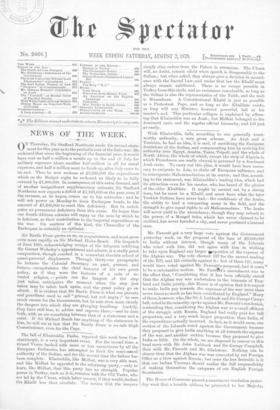The fall of Khaireddin Pasha, reported this week from Con-
stantinople, is a very important event. For the second time, a Grand Vizier, backed with more or less earnestness by all the European Embassies, has attempted to limit the semi-snored authority of the Sultan, and for the second time the failure has been complete. Khaireddin, like Midhat, was a very able man, and like Midhat he appealed to the reforming party,—only to learn, like Midhat, that this party has no strength. Popular power in Turkey, such as it is, remains with the Old Turks, who are led by the Ulema, which latter cannot, if they would, declare the .Khalif less than absolute. The notion that the lawyers
simply obey orders from the Palace is erroneous. The Ulema will, no doubt, remain silent when speech is disagreeable to the Sultan ; but when asked, they always give a decision in accord- ance with the Sacred Law, and under that law the Khalif must always remain unfettered. There is no escape possible in Turkey from this circle, and no resistance conceivable, so long as the Sultan is also the representative of the Faith, and the mob is Mussulman. A Constitutional Khalif is just as possible as a Protestant Pope, and so long as the Khalifate exists, BO long will any Minister, however powerful, fall at his master's nod. This particular collapse is explained by affirm- ing that Khaireddin was an Arab ; but Midhat belonged to the dominant caste and the regular official hierarchy, and fell just as easily.


































